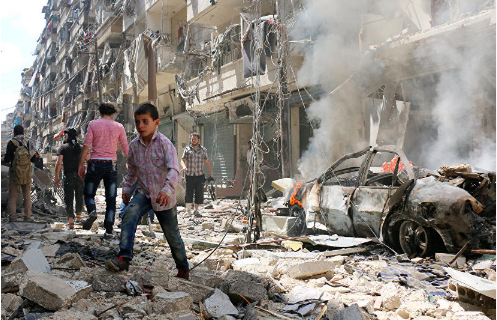Civil War Becomes Crisis
Welcome Back Issue

Violence in Aleppo, Syria
September 19, 2016
With the chaos of the November election coming up, it can be easy to forget about the rest of the world. However, right now is a crucial time for the residents of Aleppo, Syria. For the past few months the Syrians have been living in a war-torn city, and their situation has quickly become a humanitarian crisis. What has become a five-year conflict is now coming to a climax in Aleppo as rebels and pro-government forces fight for control of the city. Fighting in the city has maximized civilian deaths, which, according to the Washington Post, is at least 400,000 people.
The conflict started as a pro-democracy protest in 2011. However, the conflict turned violent when government forces shot demonstrators in the streets. The violence did not end the conflict, but escalated it, and the demonstrators began to fight back. The resulting civil war has divided Syria into areas controlled by the government regime, the rebels, and ISIS. In Aleppo, the city itself is divided in half, and in boths sides there has been an enormous death toll and infrastructure damage.
The pro-government forces that hold the western side of the city are using bombing tactics to capture the eastern rebel-held districts. The bombings in the city have been incessant, and they have affected the civilians most of all. Chamby Zepeda, Spanish teacher, commented, “The crisis in Syria is such an unfortunate situation. So many have died since this civil war began back in 2011. I don’t know much about the details, but I do know that the relations between the US and Bashar al-Assad, the president of Syria, are at best lukewarm. He doesn’t seem to be doing much to help out his own people. Consequently, many Syrians must find refuge in other countries, and by doing so, they’ve had to face hardship and severe discrimination.” All life has been halted in the city as people are afraid to go outside or continue with their lives. Children are unable to go to school, parents risk their lives just to go to work, and the citizens are cut off from provisions.
There is no foreseeable end to the conflict. Pro-government forces are backed by Russia, and are well supplied. Rebels refuse to give up, and have a tight hold on the eastern districts. In their pursuit of destruction, neither side has considered the lives of the civilians caught in the crossfire.
Most recently a power plant was the victim of bombings by the pro-government forces. This power plant pumped water to millions of people on both sides of the city. As of now, according to Al Jazeera, there are 275,000 people that have been cut off from food, water, medicine, and electricity for over a month. It’s very difficult to fix infrastructure and provide people with food during the conflict, and in addition to the bombings, the warring groups have refused humanitarian aid for civilians in need.
In the bombings, hospitals and schools have become targets. This has further limited civilians in getting help, and has caused thousands of deaths. The UN calls for the war to be moved away from the city, but the bombings have not ceased.
Movements towards peace have been slow and mostly unsuccessful. There were talks in early 2014, but unfortunately for the citizens of Aleppo, the talks broke down because of the government’s refusal to discuss demands. There have been some successful local ceasefires, but no nation wide end to the violence. The world hasn’t taken much action towards the crisis in Aleppo, and many people are ignorant of the Syrians’ struggle. Betsy Cepparulo, Global Peace and Justice Teacher, noted, “Syria’s crisis, as with those in other nearby nations recently, is a struggle that should not be foreign to Americans; it’s a struggle for democracy. The dictatorships and monarchies that have been in place for hundreds, sometimes thousands of years, are no longer desirable to citizens. All over the world, we see people standing up for their rights, for a say in their lives, for a voice in determining their own fates. We take these rights for granted at times, but we should feel lucky to have them. We should feel empathy for those seeking democracy, and we should act accordingly. Before judging, ask what you would do if you wanted freedom. Would you move? Would you fight? Would you start a nonviolent campaign in the face of violent attacks?” Unfortunately, there is too much silence and inactivity in regards to the humanitarian crisis.
It’s 2016, as people all over the world are saying, why are some many people still lacking such basic necessities as food, water, and shelter? Millions of refugees are pouring out of Syria to escape the violence, but not all can leave. Lena Urick ’17 added, “There are so many displaced people and nowhere for them to go. We see this again and again in history, and it is one of the inevitable effects of war.” However, some of the people of Aleppo are attached to their home and city, and still choose to reside there despite the violence.






























